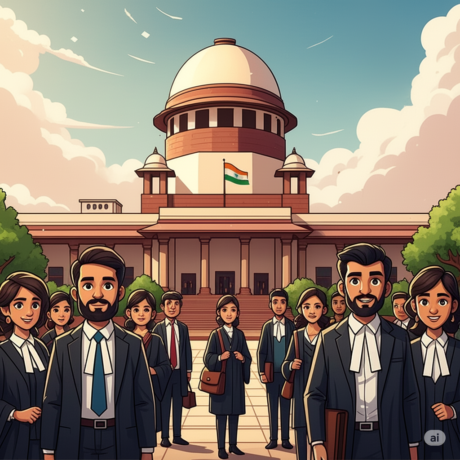Supreme Court Makes 3 Years of Practice Mandatory for Judicial Service Aspirants: What It Means for Law Graduates
The Supreme Court of India, in a landmark decision delivered in 2025, has restored the requirement of three years of practice as an advocate before appearing for the Judicial Services Examination (Civil Judge – Junior Division). This move has reignited nationwide discussion among law students, recent graduates, and legal educators.

Background of the Case
The decision comes in response to multiple applications filed in the long-standing case of All India Judges Association v. Union of India (W.P. (C) No. 1022 of 1989). The case, historically concerned with judicial reforms, included issues such as promotions, merit-based incentives, and eligibility criteria for entry into the judiciary.
One of the key questions examined recently was:
“Should the earlier requirement of minimum three years of practice at the Bar for Civil Judge (Junior Division) be restored?”
The Court, after deliberating responses from multiple High Courts, State Governments, and Bar Council of India, concluded in favor of reinstating the 3-year practice rule.
What Was the Rule Earlier?
Prior to 2002, aspiring judicial officers were required to have at least 3 years of practice as an advocate. This was in line with the spirit of Article 233(2) of the Constitution, which mandates 7 years’ practice for appointment as a District Judge.
However, based on recommendations of the Shetty Commission, the Supreme Court removed this requirement in 2002, allowing fresh law graduates to directly apply for the judicial services exam — provided they underwent 1-2 years of institutional training.
Why Has the Supreme Court Reinstated the Rule Now?
The Court considered several critical findings:
Multiple High Courts observed that fresh graduates lacked courtroom experience, legal maturity, and basic procedural understanding.
Complaints were reported about misconduct and unprofessional behavior from such officers towards lawyers and litigants.
Senior judicial officers shared concerns that practical exposure is essential to understanding court functioning, case management, and judicial temperament.
The Court noted that while theoretical knowledge is important, it cannot substitute for real-time experience gained through active law practice.
Effective Date & Key Clarification
The judgment clarifies:
Minimum 3 years of actual practice as an advocate is now mandatory to be eligible for the post of Civil Judge (Junior Division).
This experience will be counted from the date of provisional enrolment with the State Bar Council — not from the date of passing the AIBE (All India Bar Examination).
What Should Law Graduates Do Now?
If you’re a law graduate or final-year student, here’s how you can align with the new eligibility:
Enroll with the Bar Council immediately after graduation.
Start practicing under a senior advocate to gain real court experience.
Use this period to:
Work on legal drafting and case reading.
Appear in lower courts, observe proceedings, and handle briefs.
Attend bar association meetings and build a professional network.
How Can Aspirants Make the Best Use of These 3 Years?
If you’re aiming for the judiciary, treat these three years as a launchpad, not a hurdle. Here’s how:
Develop strong court presence – observe judges and senior lawyers, learn how they think and argue.
Build a portfolio of drafted documents, argued matters, and legal research.
Consider enrolling in practical law courses (like drafting, advocacy, and evidence handling).
Work with NGOs or PIL lawyers for socially impactful legal experience.
Use this time to prepare strategically for the Judicial Services Exam with real-world insight.
Final Thought: Practice Builds Perspective
This judgment re-emphasizes a core principle of justice: judges must understand the court, not just the code. By mandating three years of practice, the Supreme Court hopes to ensure that judicial officers are not only academically brilliant, but also emotionally intelligent, practically equipped, and aware of courtroom dynamics.
